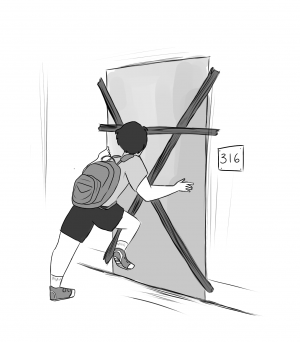Yes, club exclusivity ensures commitment
October 30, 2019
RM has some of the best clubs and teams in the county. But many of these clubs have tryouts and only accept a few new students every year. This includes but is not limited to the Debate Team, Mock Trial team and Science Bowl team. Club exclusivity can seem very discouraging. However, it benefits both the school and students because it helps focus the club on committed members, allows students to find their perfect club, and strengthens the school’s and club’s reputation.
These clubs are all exclusive, but they also have incredible winning records. RM’s debate team won their county championship four years in a row, the Mock Trial team was the 2019 state champion and RM reached semi-finals in Science Bowl last year. There may be some sort of positive correlation between club success and exclusivity, which builds a strong reputation for both school and the club.
However, for a team to be able to build this reputation, it needs members who are truly devoted to the club. Tryouts are infamous for supposedly “weeding out the weak,” but here, their main purpose is instead to find dedicated and passionate students that add something new to their community. This is especially true for freshmen and sophomores who are still trying to figure out who they want to be in high school.
By having rigorous tryouts, students will know if a club is really right for them or if their interest actually lies elsewhere. Sometimes a student may join a club due to peer pressure, hype or a winning record without taking into consideration what they really enjoy doing. An article from the Columbia Spectator put this into words well and said, “Students should consider a new club with the same attitude that a club considers them.”
Tryouts also let the student know whether the club is right for them because it can give an idea of what the club is like and the requirements to succeed. For example, Mock Trial requires students to argue qualities and traits about themselves that contributes to the team. Likewise, debate tryouts include writing about both the pro and con side of a topic and then randomly presenting one side. Both of these tryouts simulate a real competition and allow the student to experience whether they actually enjoy the activity or not.
There is also the argument that just because clubs may have a restriction on the number of members it can take to a competition, that doesn’t mean they can’t take in students who want to just have the experience. Debate team coach and social studies teacher Mr. Stillman said, “We would love to take everyone, but it’s not realistic. The tryouts are necessary, since we don’t have the manpower to handle more students.” It is just not ideal to try and take everyone since resources would be spread too thin and not every student would be given the attention they need.
Model UN changed its policy from last year to accept all students. Model UN and debate member sophomore Courtney Kim said, “Although allowing everyone a chance to participate in an activity can have positive results, I believe accepting everyone onto the team makes teams bonding very difficult. A smaller team is generally more productive and close-knit.” Therefore, it is inefficient to accept everyone into the club since it would degrade the community and quality of the club. Close- knit teams usually generate strong bonds; as a result, they are stronger on the field. The same philosophy applies to clubs. If everyone is comfortable with each other, it makes the club much stronger as a whole.
Having students in the club just to gain experience would not be worthwhile for either the club nor the student. Kim also said, “So how does the open acceptance policy truly benefit inexperienced students? That would depend on how the team trains those individuals. Everyone has the potential to succeed, but they need proper training and personal attention.” Kim’s point emphasizes how new, inexperienced club members would need one-on-one support to truly have gained more experience and skills in a particular field. Continuing Mr. Stillman’s point, if the debate team were to have everyone join, no one would really benefit because there are not enough resources for each individual student.
Also, just because a student isn’t accepted into one club doesn’t mean there are not other opportunities. Other competitive clubs like DECA, HOSA, and Forensics club allow everyone to join, and there are always other clubs to try out for. These are clubs are open to everyone because they have the resources and time to give new members the attention that they need.
Being part of a club is essential to the high school experience. It allows you to make new friends, learn new things, and gain new connections. But clubs only provide the best experience for everyone when they choose the people best suited for them, and the people are truly devoted to the club. so tryouts are necessary. Club exclusivity simulates real-life situations like jobs and colleges and is integral to a student’s learning and growth.


